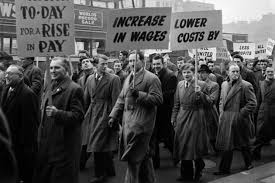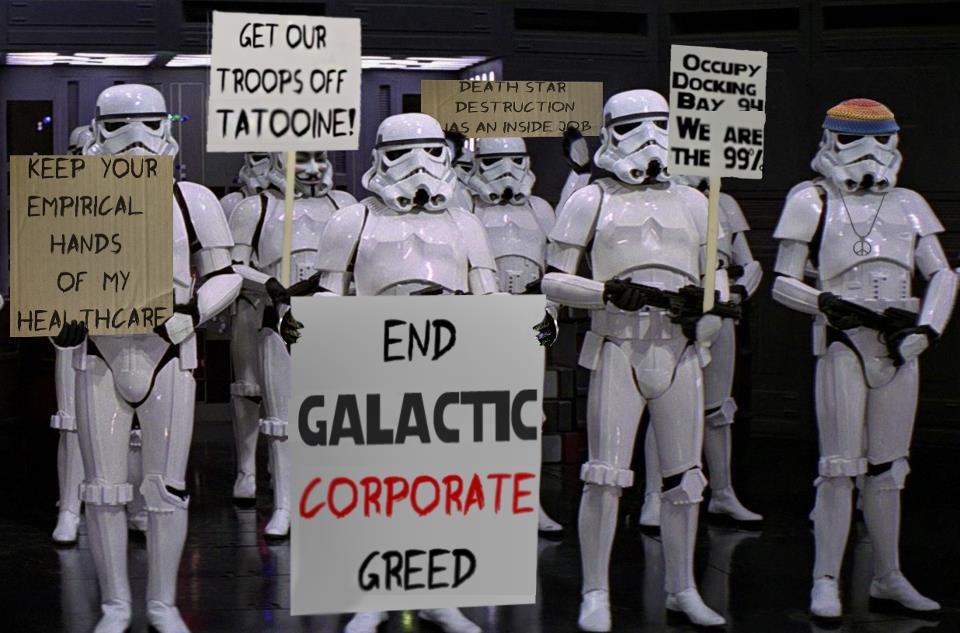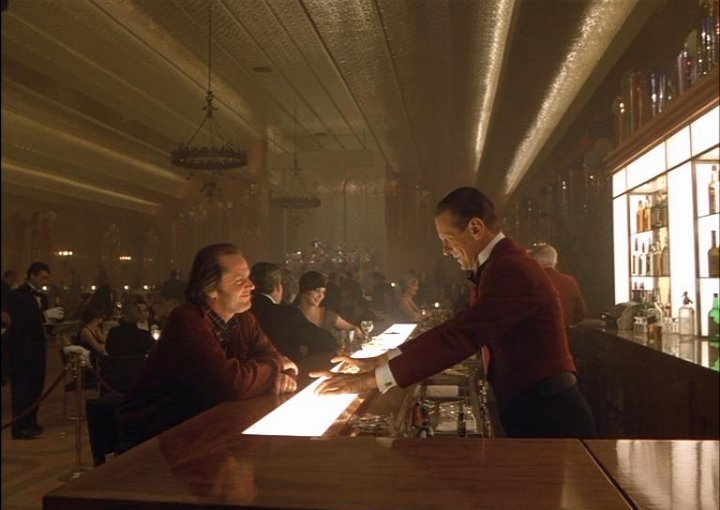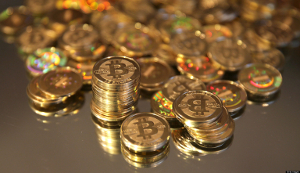In my previous post, I explained why the Feds had such a sudden crush on Bitcoin, due to its traceability. In this post, I want to tell you how to coopt Bitcoin's traceability to bring about societal change. There is an exciting new idea, called a cash-boycott, that was relayed to me by two friends. I have not heard it discussed elsewhere, so I want to tell you about this idea and what makes it such a potentially powerful force.
I'll tell the story from my own perspective. Feel free to duck out if you can't relate -- social change isn't for everyone -- but if you can stick through, this discussion will bring up how Bitcoin-style cryptocurrencies provide a new tool with which ordinary citizens can put pressure on corporations to behave better.

What do we want? Blah. When do we want it? It doesn't matter, boycotts hardly ever work.
Back in 2003, I was having dinner with some friends in a fantastic dive restaurant where there is no menu; you just sit down, order a bottle and start discussing serious stuff, like what's wrong with the world, while the chef just sends you whatever foods he thinks you'd like at that moment. At the end of the night, you get a check with just a single number that corresponds to how much fun the chef thinks you had, and you most definitely don't even think about asking for an itemized bill. It's a great place: there is no server named Joe or Jill who reads off a long list of completely banal specials of the day that always include a balsamic reduction and a bed of kale, the lack of control over the food keeps out all your attention-seeking friends with annoying food restrictions, and the billing practices guarantee that there will be no tourists even though it's in a trendy location.
That night, we were getting somewhat worked up about how broken the justice systems tend to be everywhere. As you'll recall, those were grim years. Corporations pretty much had free rein and were running the show. Just like now, except back then, we were enraged about it. Microsoft had received a slap on the wrist for its decades long practice of playing hardball with every competitor. There were guys on late night TV telling you how you should be flipping houses. The finance sector was busy creating arcane instruments that were about to implode, impacting everything, including the coffee machine in the Cornell CS department that would unceremoniously have to be hauled away someday, which would leave everyone puzzled about how the coffee machine could have gotten itself tangled up in credit default swaps, or why it should take the fall, given that no one on Wall Street was going to go to jail.
And Enron's antics had actually caused rolling blackouts throughout California. bin Ladin, who was very much alive at the time, must have been incredibly jealous. The Enron boys literally terrorized a whole state for a summer. Who would have known that if your goons shouted "Greed is Good" instead of "Allahu Aqbar," they'd instantly get a get-out-of-jail card? Ok, perhaps they wouldn't all get off scot-free; perhaps someone's kid would have to swap their 49-footer motor-yacht with a slightly more fuel-efficient 39-footer, but you knew they'd still drive it drunk and mow down swimmers.
In any case, it was evident then that the justice system was too feeble when it came to actors who were too big. That's when my friends Giray Pultar (founder of Parkyeri) and Selcuk Pultar suggested a very cool idea: why not outsource the enforcement of societal verdicts out of the justice system into the hands of ordinary people, using the currency?

End Galactic Corporate Greed.
Now, everyone has heard of a regular boycott -- vote with your pocketbook, hit them where it hurts -- and we know that consumer boycotts just don't work. Koch brothers are behind all but a few of the paper products at the supermarket, even though they seem to be manufactured by different labels. There is no way I can remember all the brand names for all the TP I am supposed to boycott. All those expensive eyeglasses are manufactured by the same cartel regardless of their brand; boycott them and you're down to hunting for monocles at the local thrift shop. Even when there are multiple players, competition typically has forced them to adopt the same business practices, in a dive to the bottom. "Do you prefer Pepsi or Coke, Nike or Adidas?" The battle is already lost.
And boycotts can't work unless a significant fraction of the consumers are involved. Let's face it, demand is mostly inflexible -- when your kid is screaming for that Tickle-Me-Elmo, you'll buy it, even if it means that someone else's kid in Bangladesh is slightly more likely to die in a warehouse fire as a result. Even when BP opened a gaping hole in the earth's mantle that was gushing a thick brown liquid of death into the ocean, approximately nobody changed their driving habits. Consumers mostly do not care about social causes, as evidenced by the sad number of signatures on change.org for even the worthiest petitions. And consumption is a terminal activity that starts and ends at the point of sale. There is no leverage; the advertising engines are too good, too strong, and the consumer sheep are already going baaa louder than you can say 'hey let's do things differently.'
What we need is a network effect, one by which a small group of cognoscenti can leverage their power and exert a force on an even larger populace to do the right thing.

"Your money's no good here." Not because someone else footed the bill, but because you're a terrible human being.
So, the Pultars had a crazy idea: why not, instead of boycotting a company's products, boycott their cash flow? For this, all we need is a currency that records where the money has been. The idea is that, if someone hands you a dollar bill that he got from the Koch brothers, you could say, with righteousness dripping from your voice, "your money's no good here." That will certainly make people think twice about working for companies that their first-hop social network does not approve. Sure, you could work for Bechtel or the Carlisle group or Halliburton, and you could even get rich doing so, but you'd have to do all your shopping at Walmart. The quaint cafes would be inaccessible to you; you'd have to run a lemonade stand on the weekend if you wanted to get anything from that place with that cute and flirty barista with the tongue piercing. Churches, which offer salvation to everyone and accept all donations, even the banknotes with white powdery residue, might have to be more discerning, and if they aren't, then you can be more discerning about which churches you want to attend. And perhaps you could be super rich off of blood diamonds, but your kids would not be able to go to a progressive school.
And this approach allows one to go beyond the first-hop neighborhood in the social graph, put leverage on third-parties and enlist them to your cause. Imagine what you'd do if you knew that the super-trendy restaurant isn't just organic, but it's also refusing to accept cash that has been through a factory farm. That'd certainly make you think twice about touching tainted cash yourself, and suddenly, you're a recruit to their cause.
This, in a very real sense, is the opposite of a regular boycott, one directed not at products but at cash. Whereas regular boycotts don't work because they're negative, product oriented, devoid of network effects, and, most importantly, go counter to people's overwhelming urge to buy things, a cash-boycott harnesses people's desire to buy things into a desire to act for the social good.
Social good, of course, is defined separately for each individual, by the behavior of people from whom they procure goods and services. If these people are jerks, you might find yourself having to, say, avoid Planned Parenthood. All good knives cut both ways, and tools that can bring about societal change can be used by awful communities just as well. History seems to show, however, that all cutting edge tools are used for progressive causes for decades before they are coopted, and by that time there are even better tools available to progressives.
So, perhaps with the naivete of being 10 years younger and having consumed a substantial portion of a bottle of hard liquor, we were convinced that this was a stellar idea. It could put a bunch of geeks in a position to enact societal change.
The only problem was that there was no electronic currency back then that could keep track of such a history of transactions.

Every Bitcoin records everywhere it has been, every single person who has touched it.
Now that Bitcoin is here, this idea is completely feasible. Every Bitcoin already records every single transaction it has been in, every single wallet it has passed through. All it takes to go from Bitcoin as it is today to a cash-boycott is a registry that maps Bitcoin wallets to their owners in the real world.
Such a list is not hard to compile: many addresses are already public. For instance, the Bitcoin donation address for virtual-notary.org is right on the web page itself. If you're one of the people who hates me for whatever reason (and there are some. Ever since we showed that the Bitcoin protocol is broken, there have been some unhinged commenters intent on killing the messenger, who somehow have not caught onto the fact that we also offered the best known fix and have been working to make the currency more robust), you could put that address on your personal blacklist. Similarly, every corporation that sells something will typically have a public address that can be harvested. From there, it's mostly a game of keeping a blacklist containing addresses and associated timestamps (encoded as positions in the blockchain), such that all coins that pass through that address after that position in the blockchain are considered null and void. You'd ask the vendor to issue you a new one, just as you would if he were to hand you a tattered, damaged US banknote. As we see more Bitcoin adoption, I can imagine companies emerging that provide Bitcoin reputation scores for different Bitcoin addresses, though I would much rather have this collection and classification be performed organically, by users.
And thinking about which companies ought to be on one's blacklist is a fun exercise. Yes, AT&T, I'm looking at you. I have not forgotten your practice of jacking my long-distance calling plan every six months. "Oh I'm sorry sir, the Friends-And-Family plan has had a tenfold rate hike; our new competitive plan is called Family-And-Friends." Nor have I forgotten how you kept charging me exorbitant fees for a phone line that did not belong to me, and kept sending me to a phone-menu hell that would inevitably hang up on me because I was not calling from the phone line that did not belong to me. You knew it would do that, but you forced me to explore every twisted turn in that phone menu anyway. I guess you could play these games and shake down people who are otherwise too busy to deal with your antics, as well as the infirm and the elderly. I guess they teach in MBA school that, when a manager cannot raise revenue through productivity increases, it's completely ok to tear at the social contract that holds us together. Well, with a cash-boycott, these people would have difficulty hiring the phone staff they need for their perfectly-legal-but-completely-unethical scams. And let's not get started with the "you need to be home between 9am and 3am every workday for all months that start with a consonant" cable company. The cable already runs into the house and all the equipment is already here; all you have to do is press a button. Anyhow, the list of people I'd line up against the wall is kind of long, but you nice people out there should think about whose money you would not accept because of your principles, and what the consequences would be for the world if you could start a snowball effect.

It's one thing to have money, it's another thing to have clean hands.
It is certainly possible to whitewash cash by putting it through a third-party service. There may be pairwise cash swaps that allow the parties to get their hands on a clean pile of cash: for instance, someone who earns but is unable to spend fracking money in Ithaca could swap it with someone who earns their salary at a hippy commune in Appalachia. This kind of pooling and redistribution would be performed by what is known as a tumbler or mixer, but such behaviors would tend to get noticed, and tumblers would then end up on everyone's blacklists. Besides, on topics where there is broad societal support (e.g. "I see that you got a taxpayer-funded Wall Street bonus while young people were unable to find jobs. Why don't you have a seat over there with your tainted cash while we all re-think those bonuses? And by the way, we're still trying to figure out where our coffee machine went during the crisis."), it'd be dificult to find someone with whom to execute a successful swap.
Of course, Escobar-Jr could give his Bitcoins to, say the winner of a Bitcoin lottery, and swap his tainted dirty money for their clean lottery winnings. That's perfectly legitimate, except he'd pay about 10-15% overhead for this. Don't ask me how I know the premium paid for such laundry operations, but let's just say that this already does happen with regular cash. We don't have a solution for this, but not everything in life gets a solution, and luckily, there are only so many lottery winners who'd want to swap and end up with Escobar-Jr's problem in their hands.
So, mixers, tumblers and regular laundering operations could be used to get around a cash-boycott, but not without cost and not for long without being detected. The opportunity to put pressure on people opens up a novel opportunity for enacting social change.
We'll leave you with this thought: if you were unhappy with the government shutdown, you could refuse to touch the money that has been paid to the people who shut it down. They can pay themselves all they like, but they would have to take those coins to their graves. It sounds almost like poetic justice.
It's an exciting world ahead with Bitcoin, and we haven't even begun to touch the new kinds of applications enabled by a fully-traceable transaction graph.